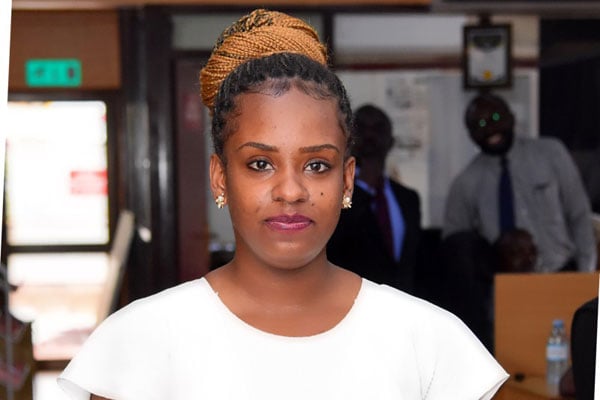Uganda rebuffs US, UN on anti-gay law

Constitutional Court judges deliver judgment on the petition challenging the constitutionality of the Anti-Homosexuality Act in Kampala on April 3, 2024. PHOTO / REUTERS
What you need to know:
- Washington and the world body’s agency on human rights condemn the Constitutional Court’s upholding of the legislation that they want Kampala to repeal in its entirety.
The United States and United Nations agency on human rights have separately condemned Uganda’s Constitutional Court decision to uphold the Anti-Homosexuality Act enacted last May.
Twenty-two petitioners led by Mr Fox Odoi, the representative of West Budama North East in the 11th Parliament, filed a petition last year against the Attorney General and three others to challenge the constitutionality of the legislation.
In a judgment on Wednesday, a five-member Coram headed by the Deputy Chief Justice Richard Butera decided that:
“We respectfully decline to nullify the Anti-Homosexuality Act, 2023, in its entirety as has been sought by the petitioners … neither would we grant a permanent injunction against its enforcement as invited to do…”
‘ US deeply concerned’
In a statement on the verdict, the US Secretary of State, Antony Blinken, asked Uganda to repeal the impugned legislation and “respect the human dignity of … and provide equal protection to all individuals under the law”.
He said Washington was deeply concerned about reports of human rights abuses in Uganda, including against lesbians, gays, bisexuals, transgender, queer and inter-sex (LGBTQI+) community.
In Kampala, Mr Ofwono Opondo, the executive director of the Uganda Media Centre, said they accept the Wednesday court decision and dismissed foreign disapprovals as inconsequential.
If Mr Blinken is aggrieved, Mr Opondo said, he or the President Joe Biden administration should sponsor an appeal against the judgment at Uganda’s Supreme Court.
“The government of Uganda believes in the rule of law, including laws validly passed by our representative and democratic Parliament, as well as the decisions of its Judiciary whenever there is a dispute to settle,” he said.
The judges nullified provisions of the Act on unhousing homosexuals and or reporting them to police, wins that Secretary Blinken described as “small and insufficient” to safeguard human rights.
“The remaining provisions of the AHA pose grave threats to the Ugandan people, especially LGBTQI+ Ugandans and their allies, undermine public health, clamp down on civic space, damage Uganda’s international reputation, and harm efforts to increase foreign investment,” he said in a statement.
In the Wednesday court decision, Uganda’s Judiciary noted that the presiding judges based their judgment on, among others, the fact that there is no global consensus “regarding non-discrimination based sexual orientation, gender identity, gender expression and sex characteristics (SOGIESC)”.
“This is reflected in the fact that to-date non-discrimination on the basis of SOCIESC variables has not explicitly found its way into international human rights treaties,” they noted, adding, “It has been ‘vetoed’ by a bloc of resistant (UN) member states that has prevented the adoption of a binding declaration or similar instrument to strengthen protections for LGBTI human rights.”
The judges, the Judiciary said, took note of the conflict in international human rights law between upholding a universal understanding of human rights and respecting the diversity and freedom of human cultures, “with no one culture diminishing the dignities of the other”.
Delicate balance
Their verdict represented a delicate balance between “individuals’ right to self-determination and communal or societal right to social, political and cultural self-determination”, according to the Judiciary-provided summary.
Parliament, which enacted the impugned legislation in May 2023, has defended it as key safeguard to protect Uganda’s family values, cultures and tradition against what they allege is sponsored recruitment by foreign actors of Ugandan youth, into homosexuality.
Neither side has provided evidence to prove their competing claims: On Uganda’s side of paid-for homosexuals and on the part of donors and pro-gay lobbyists regarding rising attacks on gays and lesbians in the country.
These differences have broadly played out as between the West, where most countries retail and promote sexual orientation as a human right, and most of Africa, where the practice is abhorred as an immorality to be defeated, mirroring a global polarisation over the matter.
This notwithstanding, the US Department of State Spokesperson Matthew Miller, in answer to a journalist’s question following the Wednesday judgment, said they were “deeply troubled by human rights abuses” in Uganda.
The Anti-Homosexuality Act, he said, undermines the rights, prosperity, and welfare of all Ugandans.
Global responses since the Constitutional Court decision have varied, with many development partners back on the drawing to determine how best to respond. At the headquarters of the UN Human Rights in Geneva, Switzerland, the agency’s chief Volker Türk echoed calls for repeal of the “discriminatory” anti-gay law, something Kampala flatly rejects.
UN speaks
He argued that Uganda’s criminalisation of same-sex relations breach its international human rights treaty obligations and, without providing evidence, claimed that rights of 600 people had been abused since enactment of the law.
“It must be repealed in its entirety,” he said.
Kampala yesterday laughed off Mr Türk’s suggestions that Uganda’s Equal Opportunities Act be amended to enshrine sexual orientation, gender identity and expression as prohibited grounds for discrimination.
Background
After President Museveni signed the legislation into law on May 26, 2023, the US President Biden administration imposed travel and visa restrictions on Ugandan officials, revoked Speaker Anita Among’s visa and sanctioned the Commissioner General of Uganda Prisons, Dr Johnson Byabashaija.
Speaker Among, like other notables, scoffed off Washington’s onslaught, and revealed that she had endured worse threats and harassment from gay rights groups and lobbyists throughout the period Parliament considered the legislation.
The World Bank in August pulled the plug on new financing to Uganda on grounds that the anti-gay law “fundamentally contradicts [its] values”.
His call comes at a time of increasing number of countries around the world, making tougher laws to punish homosexuality on grounds that the sexual orientation campaign is sponsored to undermine traditions and cultures of others.
Meanwhile, Mr Andrew Mwenda, one of the lead petitioners, yesterday asked western governments and gay lobbyists to keep away, warning that their threats or actions of sanctions validate local suspicions that they are masterminds of the LGBTQ+ movement.





